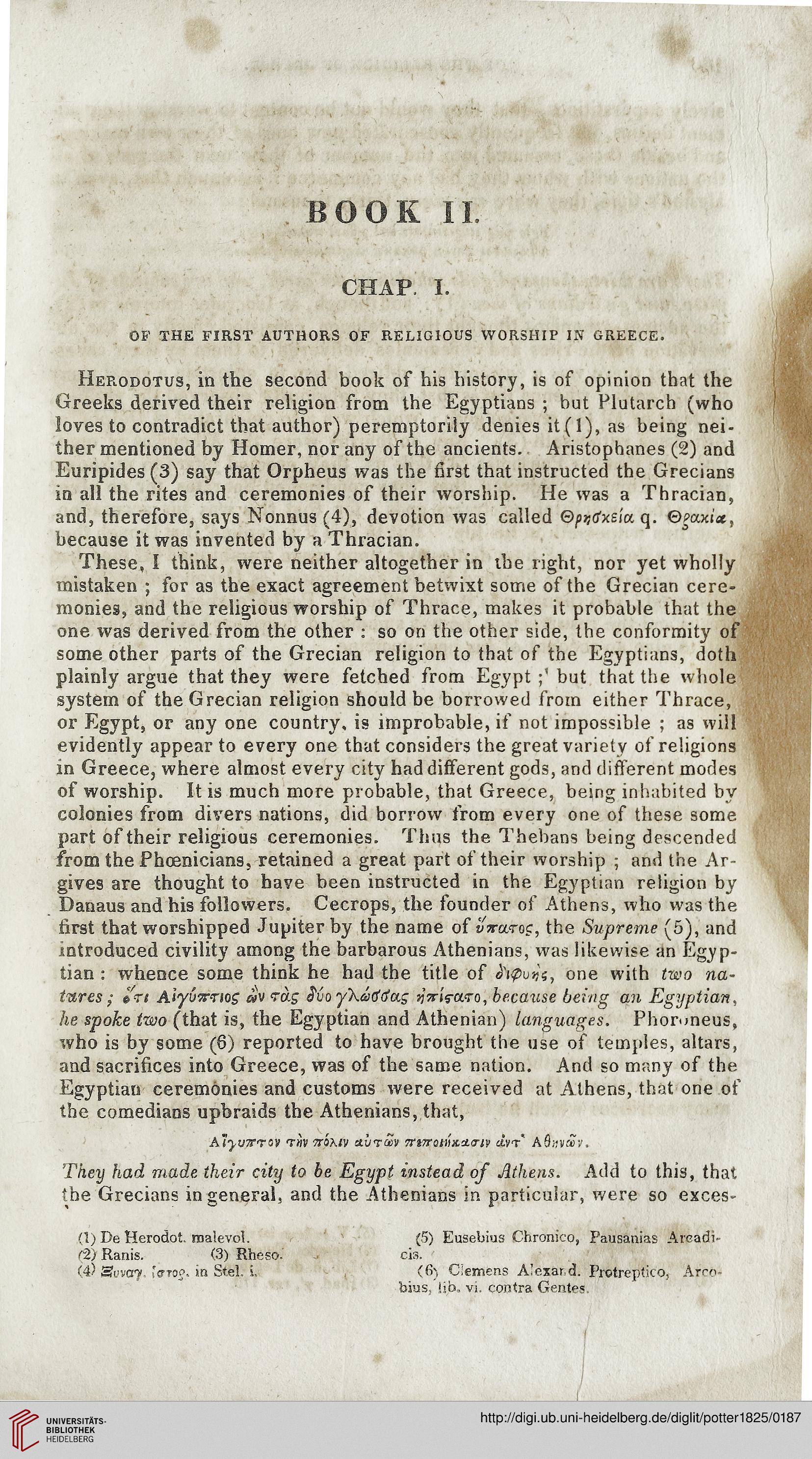BOOK II.
CHAP I.
of the first authors of religious worship in greece.
Herodotus, in the second book of his history, is of opinion that the
Greeks derived their religion from the Egyptians ; but Plutarch (who
loves to contradict that author) peremptorily denies it(l), as being nei-
ther mentioned by Homer, nor any of the ancients. Aristophanes (2) and
Euripides (3) say that Orpheus was the first that instructed the Grecians
in all the rites and ceremonies of their worship. He was a Thracian,
and, therefore, says Nonnus (4), devotion was called Qprrfxsia q. ©|axi«,
because it was invented by a Thracian.
These, I think, were neither altogether in ihe right, nor yet wholly
mistaken ; for as the exact agreement betwixt some of the Grecian cere-
monies, and the religious worship of Thrace, makes it probable that the
one was derived from the other : so on the other side, the conformity of
some other parts of the Grecian religion to that of the Egyptians, doth
plainly argue that they were fetched from Egypt ;' but that the whole
system of the Grecian religion should be borrowed from either Thrace,
or Egypt, or any one country, is improbable, if not impossible ; as will
evidently appear to every one that considers the great variety of religions
in Greece, where almost every city had different gods, and different modes
of worship. It is much more probable, that Greece, being inhabited by
colonies from divers nations, did borrow from every one of these some
part of their religious ceremonies. Thus the Thebans being descended
from the Phoenicians, retained a great part of their worship ; and the Ar-
gives are thought to have been instructed in the Egyptian religion by
Danaus and his followers. Cecrops, the founder of Athens, who was the
first that worshipped Jupiter by the name of v*cvng, the Supreme (5), and
introduced civility among the barbarous Athenians, was likewise an Egyp-
tian : whence some think he had the title of h<pu^, one with two na-
tures ; »ti Aiyfonog »v rag i"vo yXatftfug jjViVcwo, because being an Egyptian,
he spoke two (that is, the Egyptian and Athenian) languages. Phoroneus,
who is by some (6) reported to have brought the use of temples, altars,
and sacrifices into Greece, was of the same nation. And so many of the
Egyptian ceremonies and customs were received at Athens, that one of
the comedians upbraids the Athenians, that,
They had made their city to be Egypt instead of Athens. Add to this, that
the Grecians in general, and the Athenians in particular, were so exces-
(\) De Herodot. roalevol. (5) Eusebius Chronico, Pausanias Arcadi-
(2) Ranis. (3) Rheso. eh.
Iv Sway. firTOj. in Stel. i. (6) Clemens Alcxar d. Prolreptico, AfrcO-
bius, !ib. vi. contra Gentes.
1
I
CHAP I.
of the first authors of religious worship in greece.
Herodotus, in the second book of his history, is of opinion that the
Greeks derived their religion from the Egyptians ; but Plutarch (who
loves to contradict that author) peremptorily denies it(l), as being nei-
ther mentioned by Homer, nor any of the ancients. Aristophanes (2) and
Euripides (3) say that Orpheus was the first that instructed the Grecians
in all the rites and ceremonies of their worship. He was a Thracian,
and, therefore, says Nonnus (4), devotion was called Qprrfxsia q. ©|axi«,
because it was invented by a Thracian.
These, I think, were neither altogether in ihe right, nor yet wholly
mistaken ; for as the exact agreement betwixt some of the Grecian cere-
monies, and the religious worship of Thrace, makes it probable that the
one was derived from the other : so on the other side, the conformity of
some other parts of the Grecian religion to that of the Egyptians, doth
plainly argue that they were fetched from Egypt ;' but that the whole
system of the Grecian religion should be borrowed from either Thrace,
or Egypt, or any one country, is improbable, if not impossible ; as will
evidently appear to every one that considers the great variety of religions
in Greece, where almost every city had different gods, and different modes
of worship. It is much more probable, that Greece, being inhabited by
colonies from divers nations, did borrow from every one of these some
part of their religious ceremonies. Thus the Thebans being descended
from the Phoenicians, retained a great part of their worship ; and the Ar-
gives are thought to have been instructed in the Egyptian religion by
Danaus and his followers. Cecrops, the founder of Athens, who was the
first that worshipped Jupiter by the name of v*cvng, the Supreme (5), and
introduced civility among the barbarous Athenians, was likewise an Egyp-
tian : whence some think he had the title of h<pu^, one with two na-
tures ; »ti Aiyfonog »v rag i"vo yXatftfug jjViVcwo, because being an Egyptian,
he spoke two (that is, the Egyptian and Athenian) languages. Phoroneus,
who is by some (6) reported to have brought the use of temples, altars,
and sacrifices into Greece, was of the same nation. And so many of the
Egyptian ceremonies and customs were received at Athens, that one of
the comedians upbraids the Athenians, that,
They had made their city to be Egypt instead of Athens. Add to this, that
the Grecians in general, and the Athenians in particular, were so exces-
(\) De Herodot. roalevol. (5) Eusebius Chronico, Pausanias Arcadi-
(2) Ranis. (3) Rheso. eh.
Iv Sway. firTOj. in Stel. i. (6) Clemens Alcxar d. Prolreptico, AfrcO-
bius, !ib. vi. contra Gentes.
1
I





